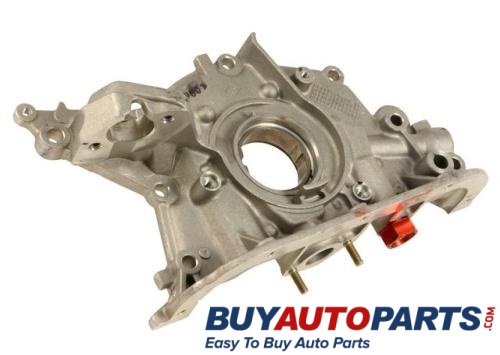The oil pump supplies the oil needed to lubricate your engine when it is running, and prevents metal-to-metal contact between the engine components. It also absorbs the heat from the running components of the engine. Although the pump is one of the sturdiest components in your vehicle, it is important to know the signs of a failing oil pump before it fails completely. If the oil pump is worn or not functioning, the engine will suffer from oil starvation, which will result in severe engine damage. This article discusses the symptoms of a poor oil pump.

Significant Decrease in Engine Oil Pressure
Since the primary function of the oil pump is to regulate oil pressure, a bad oil pump will cause the oil pressure to decrease in the engine. The first indicator will almost always be the appearance of the low oil pressure warning light on your dash. Be sure to check the oil level, and add the required amount of oil. If the problem persists, it may be with your oil pump. If ignored, the following symptoms can also occur.
Increased Engine Temperature
When oil gets pushed through the engine, it helps the engine remain cool by lubricating the moving components. A lack of oil in the engine will cause components to rub against each other, resulting in high engine temperatures. The heat light on your dashboard will turn on to alert you of the increased engine temperature. Overheated engines can lead to potentially worse problems. It is therefore advisable to address the issue at the earliest.
Noise
An unusual noise from the hydraulic lifters, the valve train, or the oil pump is an audible indicator of a failing oil pump. When the engine is properly lubricated, the hydraulic lifters are virtually silent, so any noise coming from the lifters will indicate a lack of oil. The valve-train system also includes moving components like pushrods, guides and seals. Without oil, these parts will cease to function correctly or quietly. Lastly, if you hear a whining or whirring in the oil pump, it is an indicator that the oil pump has failed internally.
When you encounter any of the above explained symptoms, examine your oil pump thoroughly. If you inspect the part yourself, look for debris inside the pump. Impurities in the pump is a sure sign that the pump has suffered damage. You can otherwise have your oil pump inspected by a mechanic.
Knowing the causes of failure of an oil pump can help you maintain your new pump. You cannot prevent an oil pump from wearing out due to normal wear and tear. However, you can ensure its durability by following the right maintenance procedures, and catching any faults in the other parts of your car that could have an impact on the performance of the oil pump.
If a component in your vehicle depends on a fluid, and goes bad prematurely, the first step in troubleshooting should be to check the level of fluid. In case of an oil pump, the oil may leak out of the system through cracks or holes. This will decrease the level of oil in the system, preventing the pump from delivering its optimal performance.
If the oil is not changed within the specified intervals, it can result in an accumulation of grime in the oil pump. This can cause the pump to undergo an ill-timed failure. When extraneous substances enter the oil, it will also cause the pump to go bad.


